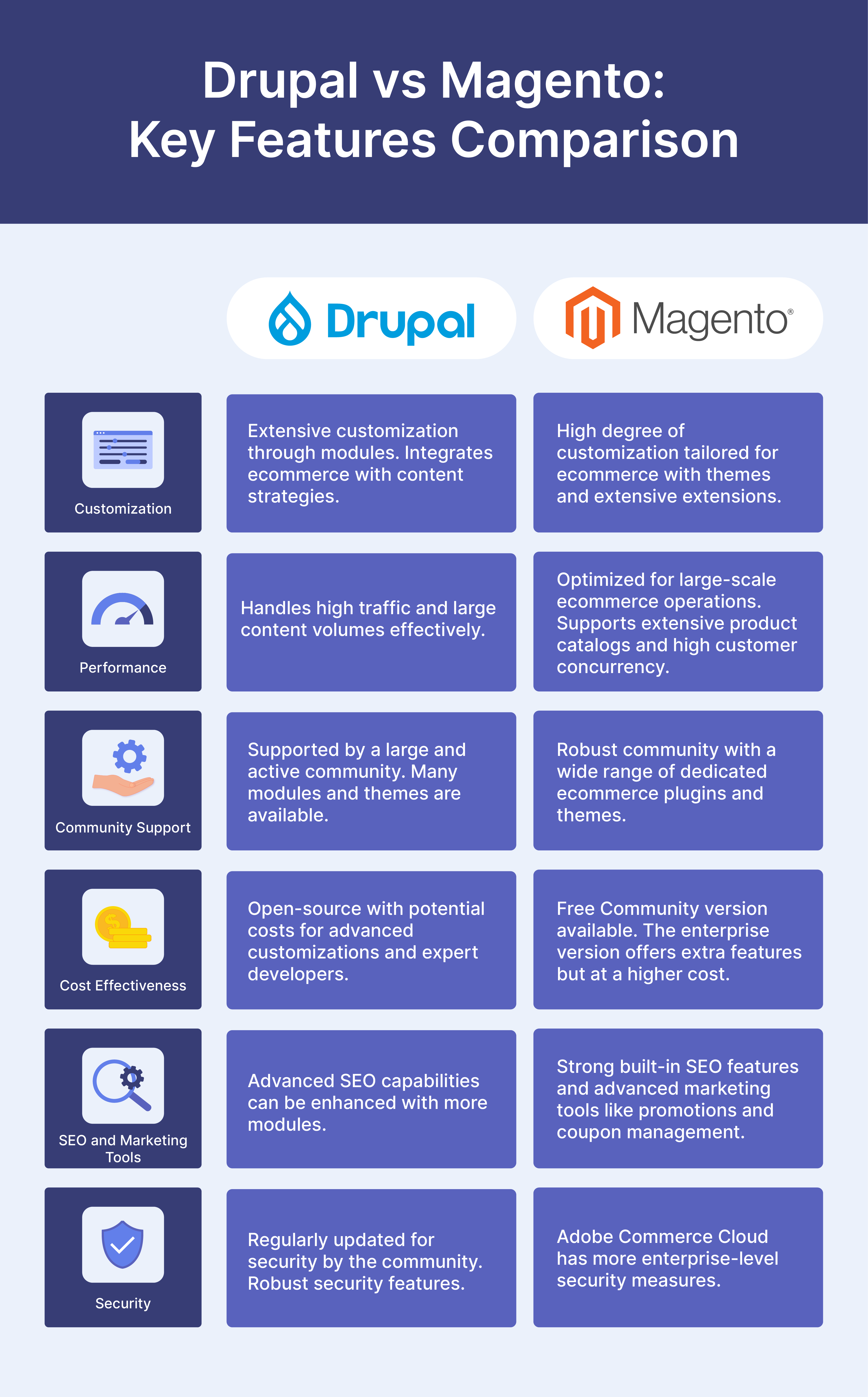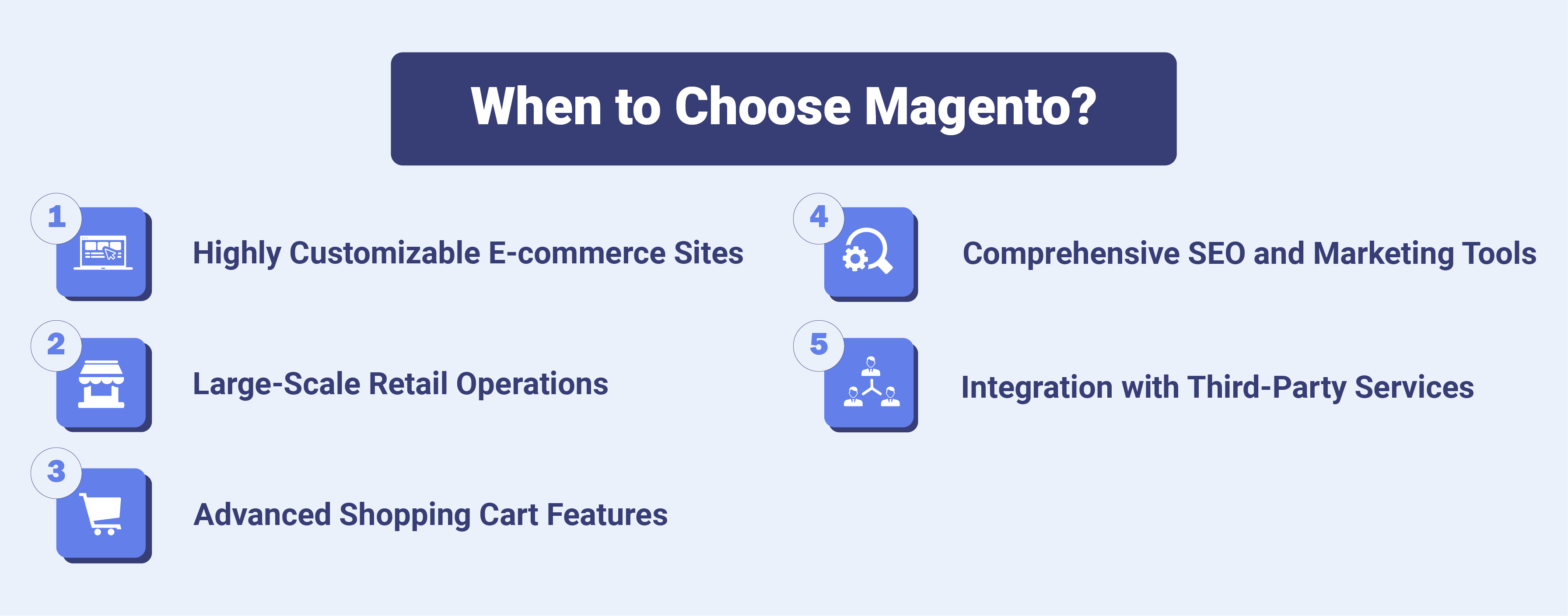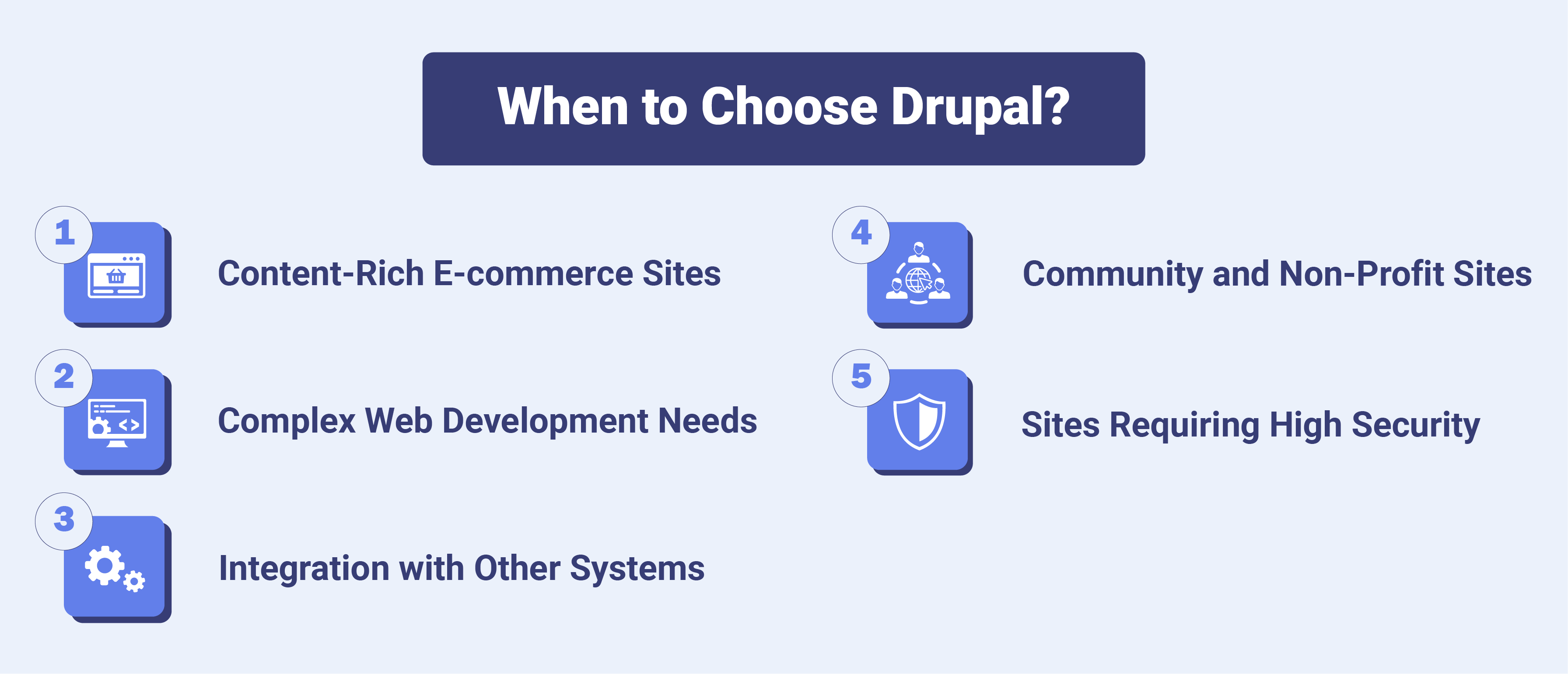
Drupal vs Magento: Choosing the Best Ecommerce Platform
Are you torn between Drupal vs. Magento for your ecommerce needs? This article guides you through the considerations for selecting between Magento and Drupal. It focuses on their deployment in various business scenarios.
Key Takeaways
-
Drupal excels in integrating e-commerce with content management strategies.
-
Magento offers a high degree of customization for e-commerce through themes and extensions.
-
Magento’s community has its focus on e-commerce innovations and specialized needs.
-
Drupal's community supports CMS development and contributes to e-commerce integrations.
-
Drupal’s interface is more user-friendly for new users.
-
Magento offers an interface specifically designed for managing online stores.
What is Drupal?

Drupal is a versatile content management system (CMS) that caters to all kinds of ecommerce sites. From simple blogs to complex corporate websites.
It has a modular design and a strong taxonomy system. It allows for extensive customization and scalability.
The platform is open-source and supported by a community of developers. This community contributes to its development. It keeps Drupal a cutting-edge option for building ecommerce websites.
What is Drupal Commerce?
Drupal Commerce is an extension of Drupal. It integrates commerce capabilities within the CMS. It enables users to leverage powerful content management features and ecommerce capabilities.
Drupal Commerce is built from the ground up to integrate with Drupal. It works seamlessly with the deep capabilities of Drupal's CMS. It's not an add-on but a fully-fledged ecommerce solution. It is designed to leverage the same framework as the CMS.
What is Magento?

Magento is a purpose-built ecommerce platform now a part of Adobe Commerce. It provides online merchants with unprecedented control over the look, content, and functionality of their store.
It has a rich set of features, scalability, and reliability. It is a preferred choice for large-scale online retailers. Magento offers a comprehensive feature set.
-
Advanced marketing
-
Search engine optimization
-
Catalog management tools
Overview of Magento 2 and Adobe Commerce
Magento 2 offers significant improvements over its predecessor. For example, enhanced performance, streamlined customization processes, and better codebase. Adobe Commerce extends these capabilities. It provides cloud-hosted reliability, enhanced security features, and integrated B2B functionality.
Drupal vs Magento: Key Features Comparison

| Feature | Drupal | Magento |
|---|---|---|
| Customization | Extensive customization through modules. Integrates ecommerce with content strategies. | High degree of customization tailored for ecommerce with themes and extensive extensions. |
| Performance | Handles high traffic and large content volumes effectively. | Optimized for large-scale ecommerce operations. Supports extensive product catalogs and high customer concurrency. |
| Community Support | Supported by a large and active community. Many modules and themes are available. | Robust community with a wide range of dedicated ecommerce plugins and themes. |
| Cost Effectiveness | Open-source with potential costs for advanced customizations and expert developers. | Free Community version available. The enterprise version offers extra features but at a higher cost. |
| SEO and Marketing Tools | Advanced SEO capabilities can be enhanced with more modules. | Strong built-in SEO features and advanced marketing tools like promotions and coupon management. |
| Security | Regularly updated for security by the community. | Robust security features. Adobe Commerce Cloud has more enterprise-level security measures. |
Magento vs Drupal: Cost of Ownership
1. Initial and Ongoing Costs
Drupal
Setting up a Drupal website can be less expensive. But that is true only if you use minimal custom modules and existing themes. But, the complexity of Drupal Commerce for ecommerce capabilities may need more customization.
Ongoing costs include:
-
Hosting
-
Maintenance
-
Security updates
-
Periodic redesigns
Drupal's modular nature often necessitates continuous updates and potential scalability solutions. It can increase maintenance expenses over time.
Magento
The initial setup cost for a Magento store tends to be higher. Magento Commerce includes a license fee. Magento Open Source is free but requires customization to meet specific ecommerce needs.
Ongoing costs involve hosting to handle Magento’s resource-intensive platform. Regular updates, security patches, and optimizing the store's performance are also needed.
2. Developer Availability and Cost
Magento
Magento developers are highly specialized, reflecting the platform’s complexity and robust functionality. The cost of hiring a Magento developer is higher due to their specialized skills.
Drupal
The availability of Drupal developers is broader due to their use as CMSs, in addition to e-commerce. The cost might be lower compared to Magento developers. However, expertise in Drupal Commerce can command higher fees.
2 Examples of Drupal: Case Studies
1. Timberland, New Zealand
Timberland uses Drupal Commerce to integrate complex product configurations and regional variations. The platform supports diverse content alongside a comprehensive product catalog.
2. Fooda
Fooda utilizes Drupal to manage vast amounts of content. It has complex scheduling options for many locations and menus. It showcases Drupal’s capability to handle detailed custom content alongside commerce needs.
2 Examples of Magento: Case Studies
1. Land Rover
Their official merchandise store utilizes Magento. It uses the platform to manage a global-scale operation with complex product lines. Magento meets their need for high customization in both marketing and customer interaction.
2. Sigma Beauty
Sigma Beauty uses Magento to manage their broad product range and complex inventory. Their inventory spans across various countries with different pricing and marketing strategies.
Drupal Adoption and Preferences
Various sectors that need strong content and commerce integration have adopted Drupal.
1. Government and Education
Drupal is a preferred choice in the government and education sectors. It is due to its high-security standards and flexibility in content management. For instance, over 150 countries have government sites built on Drupal.
2. Media and Publishing
Major media and publishing houses opt for Drupal. It is because of its superior content management and multi-site capabilities. Drupal powers sites for many top media companies. It allows them to handle vast amounts of content and traffic.
3. Non-Profit Organizations
Drupal’s no-cost entry point and scalability make it a favorite among non-profits. It helps them create impactful, content-rich websites with limited budgets.
Magento Adoption and Preferences
Magento dominates in sectors that demand advanced ecommerce functionalities.
1. Retail and Consumer Goods
Magento leads in the retail sector, especially among mid-to-large-sized businesses. Companies like Ford, Coca-Cola, and Nike use Magento to power their online stores.
2. Fashion and Apparel
This sector favors Magento. This is due to its strong handling of complex product catalogs and variations. Magento supports intricate pricing strategies, promotional tactics, and customer segmentation. Fashion e-commerce needs these features.
3. B2B Ecommerce
Magento's robust suite of B2B features, like bulk ordering and customer-specific pricing. Magento is suitable for business-to-business ecommerce setups. Its market share in the B2B segment is growing. It is a platform that can accommodate complex B2B operations.
When to Choose Magento?

Magento is an ideal choice for businesses focused on sales and online transactions. Here are some scenarios where Magento could be the better choice:
1.Highly Customizable E-commerce Sites
Magento offers extensive options for an e-commerce website that you can highly customize. It supports complex product catalogs, varied payment gateways, and intricate shipping requirements.
2.Large-Scale Retail Operations
Magento is the best choice for businesses with large inventories. Its robust infrastructure can handle large volumes of transactions and data.
3. Advanced Shopping Cart Features
Magento provides an advanced shopping cart system. It can manage many product options and variations. Must for retail businesses with diverse product lines.
4. Comprehensive SEO and Marketing Tools
Magento has powerful SEO tools and marketing features. It helps boost visibility and drive sales. It includes capabilities like search engine-friendly URLs, promotions, and discount codes.
5. Integration with Third-Party Services
Magento's ecosystem supports extensive third-party integrations. It allows businesses to add ERP systems, payment processors, and shipping services.
When to Choose Drupal?

Drupal is a more content-oriented platform. It is suitable when content management is as critical as commerce functionalities. Consider Drupal when:
1. Content-Rich E-commerce Sites
Drupal is an excellent choice if your business model provides extensive content. Drupal's superior content management capabilities are preferable for blogs, news, or educational resources.
2. Complex Web Development Needs
Drupal allows for more flexibility in web development. It caters to complex site architectures and multilingual sites.
3. Integration with Other Systems
Drupal offers extensive integration options. It shines when these integrations involve complex content ecosystems.
4. Community and Non-Profit Sites
Non-profits or community-driven sites that need e-commerce functionality prefer Drupal. Its no-license cost makes it a cost-effective and robust solution.
5. Sites Requiring High Security
Drupal is the better choice for industries where data security is paramount. For example, healthcare and government.
FAQs
1. What makes Magento a superior e-commerce platform compared to Drupal?
Magento provides ecommerce features tailored for large-scale operations and complex online stores. It offers advanced SEO tools, robust catalog management, and a powerful shopping cart. It is unlike Drupal, which focuses more on content management.
2. How does Drupal Commerce enhance Drupal's capabilities for e-commerce?
Drupal Commerce integrates with the Drupal CMS. It allows users to leverage Drupal's strong content management capabilities alongside ecommerce functionalities. It is a versatile choice for content-rich ecommerce sites.
3. Can I use another platform like WordPress instead of Drupal or Magento for ecommerce?
WordPress, with plugins like WooCommerce, is a viable option for smaller ecommerce sites. However, it may not offer the same level of customization and scalability as Magento or the integrated content management features of Drupal.
4. What are the technical costs of entry for Magento and Drupal?
Magento tends to have a higher technical cost of entry due to its complex system. It requires specialized developers. Drupal offers a more cost-effective start. Potential costs rise based on the degree of customization and scalability needs.
5. How do the Magento and Drupal communities support the development of these platforms?
Magento's community focuses on ecommerce innovations and robust third-party integrations. The Drupal community offers extensive support and resources for CMS and e-commerce development.
Summary
Magento vs Drupal comparison shows that both bring distinct advantages tailored to different business needs. Here's a quick recap to guide your decision:
-
Magento has powerful tools to boost online visibility and drive sales.
-
Magento facilitates the seamless addition of ERP systems and payment processors.
-
Drupal is best for blogs, news sites, or educational platforms.
-
Drupal offers customizable site architecture and content organization for complex web development needs.
-
With no licensing fees, Drupal is helpful for community-driven sites and non-profits.
-
Drupal is good for industries requiring stringent security measures.
Check out the best Managed Magento hosting services tailored to your Magento platform selection for a seamless ecommerce experience.



